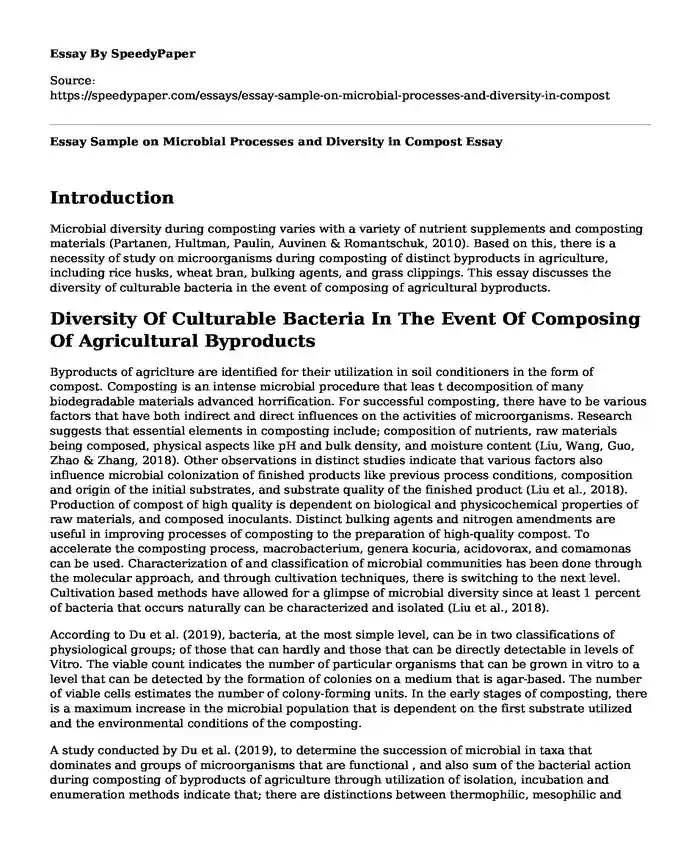Introduction
Microbial diversity during composting varies with a variety of nutrient supplements and composting materials (Partanen, Hultman, Paulin, Auvinen & Romantschuk, 2010). Based on this, there is a necessity of study on microorganisms during composting of distinct byproducts in agriculture, including rice husks, wheat bran, bulking agents, and grass clippings. This essay discusses the diversity of culturable bacteria in the event of composing of agricultural byproducts.
Diversity Of Culturable Bacteria In The Event Of Composing Of Agricultural Byproducts
Byproducts of agriclture are identified for their utilization in soil conditioners in the form of compost. Composting is an intense microbial procedure that leas t decomposition of many biodegradable materials advanced horrification. For successful composting, there have to be various factors that have both indirect and direct influences on the activities of microorganisms. Research suggests that essential elements in composting include; composition of nutrients, raw materials being composed, physical aspects like pH and bulk density, and moisture content (Liu, Wang, Guo, Zhao & Zhang, 2018). Other observations in distinct studies indicate that various factors also influence microbial colonization of finished products like previous process conditions, composition and origin of the initial substrates, and substrate quality of the finished product (Liu et al., 2018). Production of compost of high quality is dependent on biological and physicochemical properties of raw materials, and composed inoculants. Distinct bulking agents and nitrogen amendments are useful in improving processes of composting to the preparation of high-quality compost. To accelerate the composting process, macrobacterium, genera kocuria, acidovorax, and comamonas can be used. Characterization of and classification of microbial communities has been done through the molecular approach, and through cultivation techniques, there is switching to the next level. Cultivation based methods have allowed for a glimpse of microbial diversity since at least 1 percent of bacteria that occurs naturally can be characterized and isolated (Liu et al., 2018).
According to Du et al. (2019), bacteria, at the most simple level, can be in two classifications of physiological groups; of those that can hardly and those that can be directly detectable in levels of Vitro. The viable count indicates the number of particular organisms that can be grown in vitro to a level that can be detected by the formation of colonies on a medium that is agar-based. The number of viable cells estimates the number of colony-forming units. In the early stages of composting, there is a maximum increase in the microbial population that is dependent on the first substrate utilized and the environmental conditions of the composting.
A study conducted by Du et al. (2019), to determine the succession of microbial in taxa that dominates and groups of microorganisms that are functional , and also sum of the bacterial action during composting of byproducts of agriculture through utilization of isolation, incubation and enumeration methods indicate that; there are distinctions between thermophilic, mesophilic and maturing stages of compost. In the early composting stages, the most likely to be isolated are; Serratia, Enterobacter, kleb-siella, and staphylococcus. Culture-based approaches ensure for isolation of kocuria, acidovorax, micro bacterium, and comamonas form agricultural byproducts compost. To be able to grasp the nature of bacterial communities that are liked to compost; however, there has to be the utilization of sequencing of 16S rRNA genes to describe the complete bacterial community composition. Acidovorax, micro bacterium, kocuria, and comamonas can be used for acceleration of the composting process and can be prospected for degradation and assessed for their capaciy to produce hydrolytic enzymes and antimicrobial compounds.
Conclusion
Composting is a diverse process that is impacted by significant amounts of biological and environmental factors. Alterations in any of the factors influence the compost quality and the duration needed for composting. During the composting process, there are changes in temperature, changes in the bacterial population, and physicochemical aspects. When it comes to the characterization of predominant bacterial genera isolated from distinct composting phases, the complexity of degraded plant materials, and the quality of final products rely on the nature of biomass. Various agricultural products can be utilized for the provision of raw material when there is a need to offer substantial substratum for the development of microorganisms.
References
Du, J., Zhang, Y., Qu, M., Yin, Y., Fan, K., Hu, B., ... & Ma, C. (2019). Effects of biochar on the microbial activity and community structure during sewage sludge composting. Bioresource technology, 272, 171-179. Retrieved from https://www.sciencedirect.com/science/article/abs/pii/S0960852418314342
Liu, L., Wang, S., Guo, X., Zhao, T., & Zhang, B. (2018). Succession and diversity of microorganisms and their association with physicochemical properties during green waste thermophilic composting. Waste Management, 73, 101-112. Retrieved from https://www.sciencedirect.com/science/article/pii/S0956053X17309923
Partanen, P., Hultman, J., Paulin, L., Auvinen, P., & Romantschuk, M. (2010). Bacterial diversity at different stages of the composting process. BMC microbiology, 10(1), 94. Retrieved from https://bmcmicrobiol.biomedcentral.com/articles/10.1186/1471-2180-10-94
Cite this page
Essay Sample on Microbial Processes and Diversity in Compost. (2023, Apr 12). Retrieved from https://speedypaper.com/essays/essay-sample-on-microbial-processes-and-diversity-in-compost
Request Removal
If you are the original author of this essay and no longer wish to have it published on the SpeedyPaper website, please click below to request its removal:
- Essay Sample on the Importance of Entrepreneurship and Innovation Principle
- Prose Analysis Essay Example on A Rose for Emily by William Faulkner
- Essay Sample on American History. The Great Depression and the New Deal.
- Tax Evasion in Oman, Essay Example for Everyone
- Health Literacy - Article Review Essay Sample
- Essay Sample on Case: 19-2019
- Paper Example: Support and Mentor a Struggling Staff Member
Popular categories





